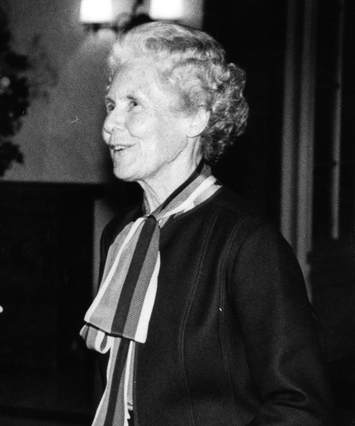Dorli's life, as recounted by his son Georg at the funeral service in the Fraumünster Church in Zurich and preached by Pastor Jörg Gutzwiller, gives a vivid and real picture of Dorli's personality. Most of us knew Dorli in various stages of his life and have vivid memories of him.
I would therefore like to use these presentations to highlight some typical aspects of Dorli's life. Georg: "Dorli's parents were typically Zurich, i.e. Protestant, commercial and prosperous. The family tradition of fashion and business acumen also became one of Dorli's characteristics. (...) A strong energy was one of the marks of her personality. The difficult thirties came with the great economic crisis. Her father became ill, and Dorli worked with her beloved mother and her older brother Otto in the family business Gassmann at the Post Office and Bahnhofstrasse. She often told us about her shopping trips with the service van, the long sewing sessions with her mother, and the manias of the spoiled ladies of Zurich, who were used to dressing in the Gassmann fashion house.
She also remembered her shopping trips to Paris, the fashion shows and the suppliers from whom she skilfully sourced. Times were tough. It was necessary to think carefully about whether to buy one or two skirts more or less.
In the middle of World War II, in 1941, she married Robert Hahnloser, who came from a business family. During the war years her beloved husband spent much of his time in active service, as did hundreds of thousands of other Swiss men. It was during this period that we, their four children, came into the world, Ruedi, me, Ueli, wisely every two years, and finally Thomi with red hair in 1949. (...) Dora and Robert met the Oxford Group with its founder, the American Frank Buchman, as early as the mid-1930s. This meeting had a definite impact on the future of each of them. Together with their friends, the young Swiss couple Hélène and Philippe Mottu and Emmy and Erich Peyer, they took the initiative, after the war, to create the Moral Re-Armament Center in Caux, above the beautiful landscape of Lake Geneva. (...)
They did this out of the conviction that Switzerland, which had stayed out of the war, had to make a special contribution to the reconstruction of Europe and the reunification of the peoples. Pastor Jörg Gutzwiller had this to say on the subject: When they founded Caux together with their fellow fighters, it was not a question of an organization. As wise businessmen, they both saw the possibility of putting into practice, on a global level, the love of neighbor that can change the course of history, effectively living forgiveness and promoting peace. In this way they became pioneers, whose action is still felt today. At a time when we are reminded that our leaders need a vision, they had one. At a time when we insist that society needs ethical values to ensure its continuity, they have committed themselves to moral criteria. At a time when it is written that there is a need for a globalization of the love of one's neighbor, they have already demonstrated this in a credible way at mid-century. "(...) Let's go back to Georg: " Much too soon, after only nine years of marriage, her husband, our father, left us forever in the spring of 1950. Dorli found herself alone with four boys. Thomi was only six months old. Her inner spiritual commitment to moral values, her deep faith, and the help of many friends, who mourn with us today, gave her the strength to shape her life and continue her mission in the family and in the service of Moral Re-Armament. But in reality the early death of her husband was the cross of her life, which she carried painfully until the end (...)
She loved the challenge. The diversity of her human relationships, family, friends, the turbulence of the 20th century, the days of happiness but also of suffering, the effort and the struggle for ideal, moral and spiritual values, the appreciation, all this contributed to the richness of her life. This allowed him to mature and become a strong personality, from which sparks sometimes flew. Her Christian faith was true and lived. Among the many messages that came from all over the world, the one from India sums up what Dorli's activity meant above all in Caux but also in the world. She was present in Caux, summer after summer, and what a presence! How many people did she not take care of and how many did she not inspire? She represented the best of post-war Europe and its visionary and far-sighted generation. As a gracious hostess, she received kings, heads of state and people from all walks of life in Caux. Her radiance had that extra divine warmth that helped people of all colors, races and classes feel at home. Many of us in India still see her receiving delegates in the welcoming halls and beautiful corridors, giving the best of herself to everyone.
フランス語


